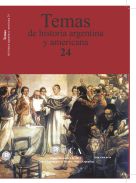Por favor, use este identificador para citar o enlazar este ítem:
https://repositorio.uca.edu.ar/handle/123456789/7653| Título: | La facultad de perdonar : conmutación de penas y división de poderes | Autor: | Corva, María Angélica | Palabras clave: | HISTORIA ARGENTINA; LEY; PENA; DIVISION DE PODERES; JUSTICIA; HISTORIA DEL DERECHO; GOBERNADORES | Fecha de publicación: | 2016 | Editorial: | Pontificia Universidad Católica Argentina. Facultad de Ciencias Sociales. Departamento de Historia. Instituto de Historia Argentina y Americana | Cita: | Corva, M.A. La facultad de perdonar : conmutación de penas y división de poderes. [en línea]. Temas de Historia Argentina y Americana. 2016, 24. Disponible en: https://repositorio.uca.edu.ar/handle/123456789/7653 | Resumen: | Resumen: En la segunda mitad del XIX la aceptación de la división de poderes, la separación de la moral y de la religión del derecho y el absolutismo de la ley, respondían a un proyecto donde lo justo estaba siendo definido por la legislación y la administración de justicia buscaba concebirse como poder independiente. En este contexto, la facultad de perdonar, heredada de la monarquía hispana como atribución del rey, pasó al pueblo, soberano en el sistema democrático, que lo delegó en sus representantes. Pero se generó entonces un conflicto entre la necesidad de modernizar el sistema penal, la abolición de la pena de muerte y la relación entre los poderes del Estado. El objetivo de este artículo es comprender y dimensionar el significado de esta facultad de perdonar que se concedió al gobernador de la provincia de Buenos Aires en 1877, año en que se sancionó la ley reglamentando la atribución del poder ejecutivo de conmutar penas. Abstract: In the second half of the 19th century the acceptance of the division of powers, separation of morality and religion of the law and the absolutism of the law, they were answering to a project where the just thing was being defined by the legislation and the administration of justice was seeking to be conceived as independent power. In this context, the power to forgive, inherited from the Spanish monarchy as the king attribution, went to the people, sovereign in the democratic system, which delegated it in its representatives. But a conflict was generated then between the need to modernize the criminal justice system, the abolition of the death penalty and the relationship between the branches of government. The aim of this article is to understand and measure the meaning of this power to forgive that it was granted to the governor of the province of Buenos Aires in 1877, when the law was passed regulating the allocation of executive power to commute sentences. |
Cobertura Espacial: | Buenos Aires (Argentina : Provincia) | URI: | https://repositorio.uca.edu.ar/handle/123456789/7653 | ISSN: | 1666-8146 2618-1924 (online) |
Disciplina: | HISTORIA | Derechos: | Acceso Abierto | Fuente: | Temas de historia argentina y americana. 2016, 24 |
| Aparece en las colecciones: | TEM - 2016 nro. 24 |
Ficheros en este ítem:
| Fichero | Descripción | Tamaño | Formato | |
|---|---|---|---|---|
| facultad-perdonar-conmutacion-penas.pdf | 235,62 kB | Adobe PDF |  Visualizar/Abrir |
Visualizaciones de página(s)
370
comprobado en 30-abr-2024
Descarga(s)
1.392
comprobado en 30-abr-2024
Google ScholarTM
Ver en Google Scholar
Este ítem está sujeto a una Licencia Creative Commons

